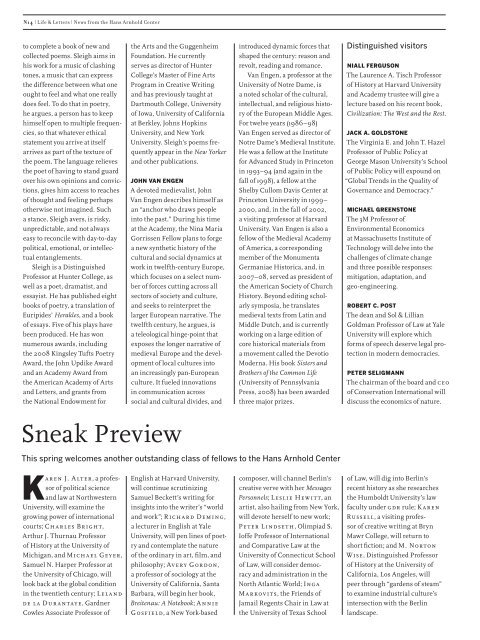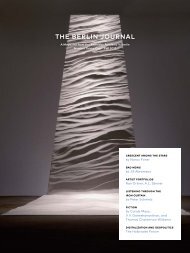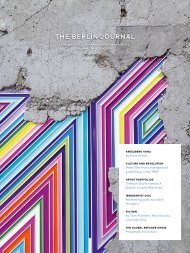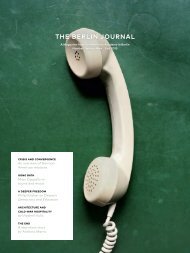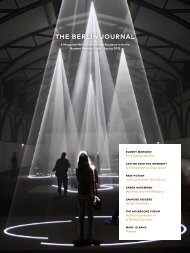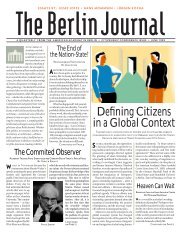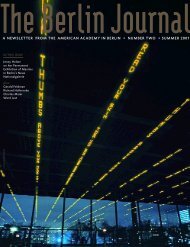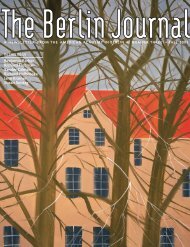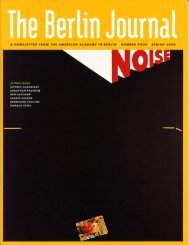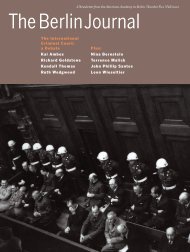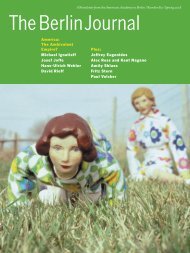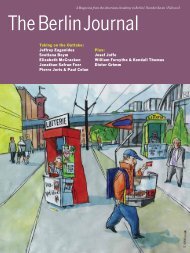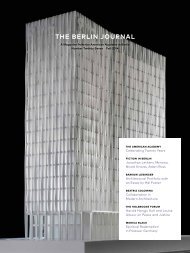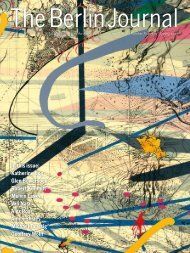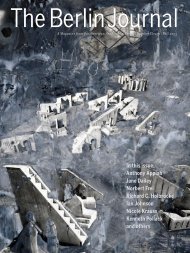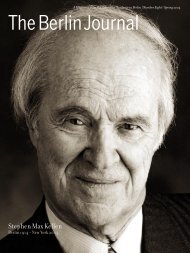Fall 2011 | Issue 21
- No tags were found...
Create successful ePaper yourself
Turn your PDF publications into a flip-book with our unique Google optimized e-Paper software.
N14 | Life & Letters | News from the Hans Arnhold Center<br />
to complete a book of new and<br />
collected poems. Sleigh aims in<br />
his work for a music of clashing<br />
tones, a music that can express<br />
the difference between what one<br />
ought to feel and what one really<br />
does feel. To do that in poetry,<br />
he argues, a person has to keep<br />
himself open to multiple frequencies,<br />
so that whatever ethical<br />
statement you arrive at itself<br />
arrives as part of the texture of<br />
the poem. The language relieves<br />
the poet of having to stand guard<br />
over his own opinions and convictions,<br />
gives him access to reaches<br />
of thought and feeling perhaps<br />
otherwise not imagined. Such<br />
a stance, Sleigh avers, is risky,<br />
unpredictable, and not always<br />
easy to reconcile with day-to-day<br />
political, emotional, or intellectual<br />
entanglements.<br />
Sleigh is a Distinguished<br />
Professor at Hunter College, as<br />
well as a poet, dramatist, and<br />
essayist. He has published eight<br />
books of poetry, a translation of<br />
Euripides’ Herakles, and a book<br />
of essays. Five of his plays have<br />
been produced. He has won<br />
numerous awards, including<br />
the 2008 Kingsley Tufts Poetry<br />
Award, the John Updike Award<br />
and an Academy Award from<br />
the American Academy of Arts<br />
and Letters, and grants from<br />
the National Endowment for<br />
the Arts and the Guggenheim<br />
Foundation. He currently<br />
serves as director of Hunter<br />
College’s Master of Fine Arts<br />
Program in Creative Writing<br />
and has previously taught at<br />
Dartmouth College, University<br />
of Iowa, University of California<br />
at Berkley, Johns Hopkins<br />
University, and New York<br />
University. Sleigh’s poems frequently<br />
appear in the New Yorker<br />
and other publications.<br />
JOHN VAN ENGEN<br />
A devoted medievalist, John<br />
Van Engen describes himself as<br />
an “anchor who draws people<br />
into the past.” During his time<br />
at the Academy, the Nina Maria<br />
Gorrissen Fellow plans to forge<br />
a new synthetic history of the<br />
cultural and social dynamics at<br />
work in twelfth-century Europe,<br />
which focuses on a select number<br />
of forces cutting across all<br />
sectors of society and culture,<br />
and seeks to reinterpret the<br />
larger European narrative. The<br />
twelfth century, he argues, is<br />
a teleological hinge-point that<br />
exposes the longer narrative of<br />
medieval Europe and the development<br />
of local cultures into<br />
an increasingly pan-European<br />
culture. It fueled innovations<br />
in communication across<br />
social and cultural divides, and<br />
Sneak Preview<br />
introduced dynamic forces that<br />
shaped the century: reason and<br />
revolt, reading and romance.<br />
Van Engen, a professor at the<br />
University of Notre Dame, is<br />
a noted scholar of the cultural,<br />
intellectual, and religious history<br />
of the European Middle Ages.<br />
For twelve years (1986–98)<br />
Van Engen served as director of<br />
Notre Dame’s Medieval Institute.<br />
He was a fellow at the Institute<br />
for Advanced Study in Princeton<br />
in 1993–94 (and again in the<br />
fall of 1998), a fellow at the<br />
Shelby Cullom Davis Center at<br />
Princeton University in 1999–<br />
2000, and, in the fall of 2002,<br />
a visiting professor at Harvard<br />
University. Van Engen is also a<br />
fellow of the Medieval Academy<br />
of America, a corresponding<br />
member of the Monumenta<br />
Germaniae Historica, and, in<br />
2007–08, served as president of<br />
the American Society of Church<br />
History. Beyond editing scholarly<br />
symposia, he translates<br />
medieval texts from Latin and<br />
Middle Dutch, and is currently<br />
working on a large edition of<br />
core historical materials from<br />
a movement called the Devotio<br />
Moderna. His book Sisters and<br />
Brothers of the Common Life<br />
(University of Pennsylvania<br />
Press, 2008) has been awarded<br />
three major prizes.<br />
This spring welcomes another outstanding class of fellows to the Hans Arnhold Center<br />
Distinguished visitors<br />
NIALL FERGUSON<br />
The Laurence A. Tisch Professor<br />
of History at Harvard University<br />
and Academy trustee will give a<br />
lecture based on his recent book,<br />
Civilization: The West and the Rest.<br />
JACK A. GOLDSTONE<br />
The Virginia E. and John T. Hazel<br />
Professor of Public Policy at<br />
George Mason University’s School<br />
of Public Policy will expound on<br />
“Global Trends in the Quality of<br />
Governance and Democracy.”<br />
MICHAEL GREENSTONE<br />
The 3M Professor of<br />
Environmental Economics<br />
at Massachusetts Institute of<br />
Technology will delve into the<br />
challenges of climate change<br />
and three possible responses:<br />
mitigation, adaptation, and<br />
geo-engineering.<br />
ROBERT C. POST<br />
The dean and Sol & Lillian<br />
Goldman Professor of Law at Yale<br />
University will explore which<br />
forms of speech deserve legal protection<br />
in modern democracies.<br />
PETER SELIGMANN<br />
The chairman of the board and ceo<br />
of Conservation International will<br />
discuss the economics of nature.<br />
Karen J. Alter, a professor<br />
of political science<br />
and law at Northwestern<br />
University, will examine the<br />
growing power of international<br />
courts; Charles Bright,<br />
Arthur J. Thurnau Professor<br />
of History at the University of<br />
Michigan, and Michael Geyer,<br />
Samuel N. Harper Professor at<br />
the University of Chicago, will<br />
look back at the global condition<br />
in the twentieth century; Lel and<br />
de la Durantaye, Gardner<br />
Cowles Associate Professor of<br />
English at Harvard University,<br />
will continue scrutinizing<br />
Samuel Beckett’s writing for<br />
insights into the writer’s “world<br />
and work”; Richard Deming,<br />
a lecturer in English at Yale<br />
University, will pen lines of poetry<br />
and contemplate the nature<br />
of the ordinary in art, film, and<br />
philosophy; Avery Gordon,<br />
a professor of sociology at the<br />
University of California, Santa<br />
Barbara, will begin her book,<br />
Breitenau: A Notebook; Annie<br />
Gosfield, a New York-based<br />
composer, will channel Berlin’s<br />
creative verve with her Messages<br />
Personnels; Leslie Hewitt, an<br />
artist, also hailing from New York,<br />
will devote herself to new work;<br />
Peter Lindseth, Olimpiad S.<br />
Ioffe Professor of International<br />
and Comparative Law at the<br />
University of Connecticut School<br />
of Law, will consider democracy<br />
and administration in the<br />
North Atlantic World; Inga<br />
Markovits, the Friends of<br />
Jamail Regents Chair in Law at<br />
the University of Texas School<br />
of Law, will dig into Berlin’s<br />
recent history as she researches<br />
the Humboldt University’s law<br />
faculty under gdr rule; K aren<br />
Russell, a visiting professor<br />
of creative writing at Bryn<br />
Mawr College, will return to<br />
short fiction; and M. Norton<br />
Wise, Distinguished Professor<br />
of History at the University of<br />
California, Los Angeles, will<br />
peer through “gardens of steam”<br />
to examine industrial culture’s<br />
intersection with the Berlin<br />
landscape.


